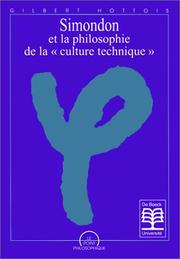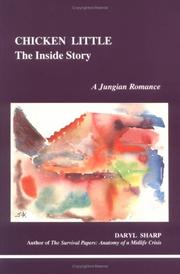| Listing 1 - 4 of 4 |
Sort by
|
Dissertation
Year: 1993 Publisher: Liège : Université de Liège, Faculté de psychologie et des sciences de l'éducation (ULg),
Abstract | Keywords | Export | Availability | Bookmark
 Loading...
Loading...Choose an application
- Reference Manager
- EndNote
- RefWorks (Direct export to RefWorks)
Nous étudions le vécu des parents en 3 temps : à la fin de la période d'adaptation, à l'entrée et 1 mois après l'entrée; attachement, détachement et séparations antérieures des parents sont trois éléments pouvant influencer le vécu de la séparation. Nous tentons de démontrer que cette séparation peut se calquer sur les 3 temps du rite de passage
CRECHE --- SEPARATION - INDIVIDUATION --- RELATION PARENTS-ENFANT --- VECU PSYCHOLOGIQUE --- CRECHE --- SEPARATION - INDIVIDUATION --- RELATION PARENTS-ENFANT --- VECU PSYCHOLOGIQUE

ISBN: 2804116824 9782804116828 Year: 1993 Volume: vol *24 Publisher: Bruxelles De Boeck
Abstract | Keywords | Export | Availability | Bookmark
 Loading...
Loading...Choose an application
- Reference Manager
- EndNote
- RefWorks (Direct export to RefWorks)
Filosofie --- Philosophie --- Simondon, G. --- Philosophers --- Technology --- Philosophes --- Technologie --- Philosophy --- Moral and ethical aspects --- Aspect moral --- Simondon, Gilbert, --- Criticism and interpretation --- Bibliography --- Critique et interprétation --- Bibliographie --- Technology and civilization. --- Individuation (Philosophy) --- Technology and civilization --- #GBIB:CBMER --- Civilization and machinery --- Civilization and technology --- Machinery and civilization --- Civilization --- Social history --- Individuals (Philosophy) --- Individuation --- Particulars (Philosophy) --- Haecceity (Philosophy) --- Simondon, Gilbert --- Individuation (Philosophy). --- Critique et interprétation --- Simondon, Gilbert. --- Simondon, Gilbert (1924-1989) --- Simondon, Gilbert, 1924-1989. Du mode d'existence des objets techniques --- Technique et civilisation --- Technique

ISBN: 1282039423 9786612039423 0585120196 9780585120195 0919123627 9780919123625 0805781587 9780805781588 9781282039421 6612039426 Year: 1993 Publisher: Toronto Inner City Books
Abstract | Keywords | Export | Availability | Bookmark
 Loading...
Loading...Choose an application
- Reference Manager
- EndNote
- RefWorks (Direct export to RefWorks)
Chicken Little: Messiah, Meshuggeneh or Metaphor? Join the author and Professor Adam Brillig in their fearless search for the truth. This is Book One of The Brillig Trilogy (with titles 67, 72).
Individuation (Psychology) --- Symbolism in literature --- Jungian psychology --- Anthropology --- Social Sciences --- Folklore --- Analytic psychology --- Analytical psychology --- Jungian psychoanalysis --- Jungian theory --- Psychoanalysis --- Signs and symbols in literature --- Symbolism in folk literature --- Psychology --- Psychological aspects --- Jung, C. G. --- Jung, Carl Gustav --- Jung, Karl Gustav, --- I︠U︡nh, Karl Hustav, --- Jung, Carl Gustav, --- Yung, Ḳ. G. --- Yungu, C. G. --- I︠U︡ng, Karl Gustav, --- יונג, קרל גוסטאב --- יונג, קרל גוסטב --- יונג, ק. ג. --- 榮格, --- C. G. ユング, --- Yūng, Kārl Gustāv, --- يونگ، کارل گستاو
Book
ISBN: 0691238189 Year: 1993 Publisher: Princeton, New Jersey : Princeton University Press,
Abstract | Keywords | Export | Availability | Bookmark
 Loading...
Loading...Choose an application
- Reference Manager
- EndNote
- RefWorks (Direct export to RefWorks)
Who decides how, when, and where Americans fall in love and get married? Virginia Wexman's acute observations about movie stars and acting techniques show that Hollywood has often had the most powerful voice in demonstrating socially sanctioned ways of becoming a couple. Until now serious film critics have paid little attention to the impact of performance styles on American romance, and have often treated "patriarchy," "sexuality," and the "couple" as monolithic and unproblematic concepts. Wexman, however, shows how these notions have been periodically transformed in close association with the appearance, behavior, and persona of the stars of films such as The Maltese Falcon, The Big Sleep, Way Down East, The Man Who Shot Liberty Valance, Sunset Boulevard, On the Waterfront, Nashville, House of Games, and Do the Right Thing. The author focuses first on the way in which traditional marriage norms relate to authorship (the Griffith-Gish collaboration) and genre (John Wayne and the Western). Looking at male and female stardom in terms of the development of "companionate marriage," she discusses the love goddess and the impact of method acting on Hollywood's ideals of maleness. Finally she considers the recent breakdown of the ideal of monogamous marriage in relation to Hollywood's experimentation with self-reflexive acting styles. Creating the Couple is must reading for film scholars and enthusiasts, and it will fascinate everyone interested in the changing relationships of men and women in modern culture.
Love in motion pictures. --- Marriage in motion pictures. --- Motion picture acting. --- Motion pictures --- Social aspects --- Acting. --- Actor. --- Affective memory. --- Anglo. --- Broken Blossoms. --- Chapter 1 (House of Cards). --- Chapter Two (play). --- Character (arts). --- Christian Dior. --- Cinema of the United States. --- Classical Hollywood cinema. --- Close-up. --- Colonization. --- Consideration. --- Courtship. --- D. W. Griffith. --- Division of labour. --- Do the Right Thing. --- Elia Kazan. --- Endogamy. --- Eroticism. --- Exogamy. --- Fan magazine. --- Femininity. --- Film noir. --- Filmmaking. --- Gary Cooper. --- Gender role. --- Genre. --- Hegemony. --- Hermann Broch. --- Hollywood Star. --- Homoeroticism. --- Homosexuality. --- House of Games. --- Ideology. --- Improvisation. --- Incest. --- Individualism. --- Individuation. --- Ingrid Bergman. --- Lauren Bacall. --- Libido. --- Lifestyle (sociology). --- Male bonding. --- Margaret Herrick Library. --- Marlon Brando. --- Marsha Norman. --- Masculinity. --- Mean Streets. --- Melodrama. --- Method acting. --- Mexicans. --- Miscegenation. --- Monogamy. --- Montgomery Clift. --- Moscow Art Theatre. --- My Darling Clementine. --- Narcissism. --- Narrative. --- Nobility. --- On the Waterfront. --- Oppression. --- Orphans of the Storm. --- Patriarchy. --- Person. --- Personhood. --- Philosophy. --- Playwright. --- Post-structuralism. --- Potentiality and actuality. --- Psychoanalysis. --- Public figure. --- Publicity. --- Richard Dyer. --- Role-playing. --- Romantic hero. --- Royal intermarriage. --- Sam Spade. --- Satire. --- Self-actualization. --- Separate spheres. --- Sex differences in humans. --- Sexual desire. --- Struggle (TV series). --- Suggestion. --- Sunset Boulevard (musical). --- Superiority (short story). --- Tall in the Saddle. --- Terminology. --- The Big Sleep. --- The Maltese Falcon (novel). --- The Man Who Shot Liberty Valance. --- The Mothering Heart. --- The Other Hand. --- War film. --- Way Down East. --- Western (genre). --- White's. --- Writing.
| Listing 1 - 4 of 4 |
Sort by
|

 Search
Search Feedback
Feedback About UniCat
About UniCat  Help
Help News
News